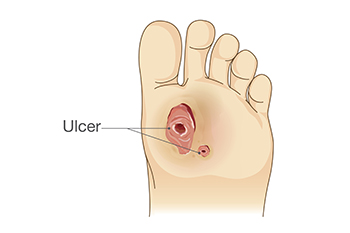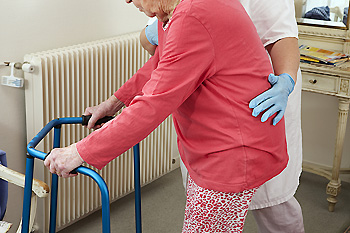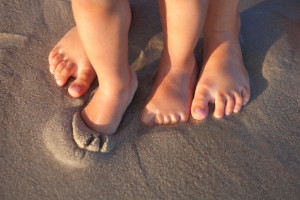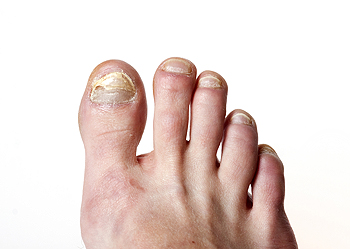Items filtered by date: June 2023
Foot Ulcers Can Be a Serious Condition

A foot ulcer is a serious wound. It is said to look like a crater in the skin and is generally found on the bottom of the foot or tip of a toe. Thick skin can gradually surround it and may act like a border. A foot ulcer can be common among diabetic patients, and immediate wound care is often sought for treatment and relief. A foot ulcer can range between being a surface wound to a deep wound, and both types can become infected if not treated. Diabetic patients can suffer from neuropathy, which is the inability to feel sensations on the feet. This may also be coupled with poor circulation, which may slow down the healing process. A foot ulcer that develops in people who have good circulation may heal in approximately six weeks, but it may take considerably longer in patients who have poor circulation. Treatment can begin with a podiatrist performing a debridement, which is trimming away diseased tissue. This can be followed by applying an appropriate dressing and recommending specialized footwear. If you have a foot ulcer, it is strongly suggested that you are under the care of a podiatrist who can successfully treat this foot condition.
Wound care is an important part in dealing with diabetes. If you have diabetes and a foot wound or would like more information about wound care for diabetics, consult with one of our podiatrists from Quad Cities Foot and Ankle Associates. Our doctors will assess your condition and provide you with quality foot and ankle treatment.
What Is Wound Care?
Wound care is the practice of taking proper care of a wound. This can range from the smallest to the largest of wounds. While everyone can benefit from proper wound care, it is much more important for diabetics. Diabetics often suffer from poor blood circulation which causes wounds to heal much slower than they would in a non-diabetic.
What Is the Importance of Wound Care?
While it may not seem apparent with small ulcers on the foot, for diabetics, any size ulcer can become infected. Diabetics often also suffer from neuropathy, or nerve loss. This means they might not even feel when they have an ulcer on their foot. If the wound becomes severely infected, amputation may be necessary. Therefore, it is of the upmost importance to properly care for any and all foot wounds.
How to Care for Wounds
The best way to care for foot wounds is to prevent them. For diabetics, this means daily inspections of the feet for any signs of abnormalities or ulcers. It is also recommended to see a podiatrist several times a year for a foot inspection. If you do have an ulcer, run the wound under water to clear dirt from the wound; then apply antibiotic ointment to the wound and cover with a bandage. Bandages should be changed daily and keeping pressure off the wound is smart. It is advised to see a podiatrist, who can keep an eye on it.
If you have any questions, please feel free to contact our offices located in Bettendorf, and DeWitt, IA and Rock Island, IL . We offer the newest diagnostic and treatment technologies for all your foot care needs.
Exercise Is a Fall Prevention Method

People who fall or who have a fear of falling may benefit from having regular physical examinations done. This can help monitor existing medicines, as dosages may need to be adjusted as the body changes. It can also help to have regular eye examinations performed that can manage eyeglass prescriptions. Many elderly patients like to exercise and can feel their bodies becoming stronger. Exercising is an important fall prevention technique, and it may also help to increase balance. Many seniors enjoy practicing Tai Chi, which can make their legs stronger. Vitamin D may be added to the diet which may help improve bone, muscle, and nerve health. Additionally, there are methods that can be implemented in the home that can make it safer. These can include installing grab bars in the toilet and shower area and improving lighting in the living area. Falling can impact the feet, and can cause havoc in completing daily activities. If you would like to learn more about fall prevention techniques, it is suggested that you confer with a podiatrist who can provide you with useful information.
Preventing falls among the elderly is very important. If you are older and have fallen or fear that you are prone to falling, consult with one of our podiatrists from Quad Cities Foot and Ankle Associates. Our doctors will assess your condition and provide you with quality advice and care.
Every 11 seconds, an elderly American is being treated in an emergency room for a fall related injury. Falls are the leading cause of head and hip injuries for those 65 and older. Due to decreases in strength, balance, senses, and lack of awareness, elderly persons are very susceptible to falling. Thankfully, there are a number of things older persons can do to prevent falls.
How to Prevent Falls
Some effective methods that older persons can do to prevent falls include:
- Enrolling in strength and balance exercise program to increase balance and strength
- Periodically having your sight and hearing checked
- Discuss any medications you have with a doctor to see if it increases the risk of falling
- Clearing the house of falling hazards and installing devices like grab bars and railings
- Utilizing a walker or cane
- Wearing shoes that provide good support and cushioning
- Talking to family members about falling and increasing awareness
Falling can be a traumatic and embarrassing experience for elderly persons; this can make them less willing to leave the house, and less willing to talk to someone about their fears of falling. Doing such things, however, will increase the likelihood of tripping or losing one’s balance. Knowing the causes of falling and how to prevent them is the best way to mitigate the risk of serious injury.
If you have any questions, please feel free to contact our offices located in Bettendorf, and DeWitt, IA and Rock Island, IL . We offer the newest diagnostic and treatment technologies for all your foot care needs.
Facts About Children’s Feet

There are basic facts involving children’s feet that are interesting to know. The bones in children’s feet do not fully develop until the age of 13, and it is helpful to provide them with shoes that have the necessary support as they grow. This is crucial in maintaining good foot health. Many parents realize they are buying shoes at an accelerated rate during the first few years after birth. Research has shown the feet grow the fastest in the first three years. Flexible and comfortable shoes are ideal to purchase, and this can help the child to get accustomed to their growing feet. The feet house one-quarter of the bones that are in the body, and the majority of babies are born with flat feet. The arch generally develops during the teenage years, and having an abnormal foot structure may cause flat feet to lead into adulthood. If you would like more information about children’s foot health, it is suggested that you speak with a podiatrist who can provide you with the knowledge you are seeking.
Making sure that your children maintain good foot health is very important as they grow. If you have any questions, contact one of our podiatrists of Quad Cities Foot and Ankle Associates. Our doctors can provide the care you need to keep you pain-free and on your feet.
Keeping Children's Feet Healthy
Having healthy feet during childhood can help prevent medical problems later in life, namely in the back and legs. As children grow, their feet require different types of care. Here are some things to consider...
Although babies do not walk yet, it is still very important to take care of their feet.
Avoid putting tight shoes or socks on his or her feet.
Allow the baby to stretch and kick his or her feet to feel comfortable.
As a toddler, kids are now on the move and begin to develop differently. At this age, toddlers are getting a feel for walking, so don’t be alarmed if your toddler is unsteady or ‘walks funny’.
As your child gets older, it is important to teach them how to take care of their feet.
Show them proper hygiene to prevent infections such as fungus.
Be watchful for any pain or injury.
Have all injuries checked by a doctor as soon as possible.
Comfortable, protective shoes should always be worn, especially at play.
If you have any questions please feel free to contact our offices located in Bettendorf, and DeWitt, IA and Rock Island, IL . We offer the newest diagnostic and treatment technologies for all your foot and ankle needs.
Is Toenail Fungus Contagious?

The toenails can look disfigured with a severe case of toenail fungus. It is caused by the human papillomavirus (HPV) and is considered to be highly contagious. This virus lives and thrives in warm and moist environments, such as public swimming pools, shower rooms, or similar areas. Some of the symptoms that are associated with toenail fungus can include yellowed nails that can become brittle, and the affected nails may emit an odor. It is beneficial to implement certain methods that are successful in preventing toenail fungus. These can consist of wearing appropriate shoes, such as flip flops or water shoes, and refraining from sharing shoes, socks, and towels. Toenail fungus does not improve without medical attention. If you have developed this condition, it is suggested that you confer with a podiatrist who can guide you toward the correct treatment options, which may include prescribed medicine.
For more information about treatment, contact one of our podiatrists of Quad Cities Foot and Ankle Associates. Our doctors can provide the care you need to keep you pain-free and on your feet.
Toenail Fungus Treatment
Toenail fungus is a condition that affects many people and can be especially hard to get rid of. Fortunately, there are several methods to go about treating and avoiding it.
Antifungals & Deterrence
Oral antifungal medicine has been shown to be effective in many cases. It is important to consult with a podiatrist to determine the proper regiment for you, or potentially explore other options.
Applying foot powder on the feet and shoes helps keep the feet free of moisture and sweat.
Sandals or open toed shoes – Wearing these will allow air movement and help keep feet dry. They also expose your feet to light, which fungus cannot tolerate. Socks with moisture wicking material also help as well.
If you have any questions please feel free to contact our offices located in Bettendorf, and DeWitt, IA and Rock Island, IL . We offer the newest diagnostic tools and technology to treat your foot and ankle needs.
